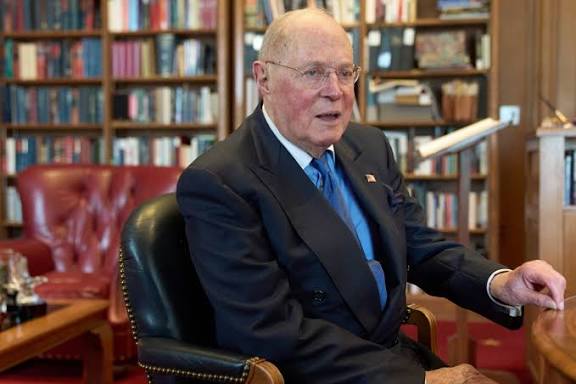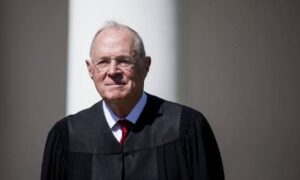Anthony Kennedy liberal or conservative: Book,Shriver,Supreme Court today

Anthony McLeod Kennedy (born July 23, 1936) is an American lawyer and jurist who served as an Associate Justice of the Supreme Court. Today we will discuss about Anthony Kennedy liberal or conservative: Book,Shriver,Supreme Court today
Anthony Kennedy liberal or conservative: Book,Shriver,Supreme Court today
Justice Anthony Kennedy, who served as an Associate Justice of the Supreme Court of the United States from 1988 until his retirement in 2018, remains one of the most debated and fascinating figures in modern judicial history. Appointed by President Ronald Reagan, Kennedy was expected to be a conservative stalwart. However, throughout his tenure, his decisions often did not align strictly with conservative orthodoxy. His opinions were sometimes critical of conservative positions, while at other times he sided with the conservative bloc on significant issues. As a result, Kennedy’s judicial philosophy defies easy categorization. Was he a liberal or a conservative, or perhaps something else entirely?
To answer this question, we need to explore his decisions on a range of issues—ranging from abortion rights and same-sex marriage to states’ rights and the death penalty—and analyze his political and ideological leanings. This article seeks to uncover whether Kennedy’s tenure should be understood as one characterized by liberalism, conservatism, or a blend of both.
A Historical Context: The Reagan Appointment

Anthony Kennedy was nominated to the Supreme Court by President Ronald Reagan in 1987 to replace the retiring Justice Lewis Powell, a moderate. Kennedy’s nomination followed the contentious rejection of Robert Bork, a conservative nominee who had been opposed by liberal senators for his radical views. Reagan’s decision to nominate Kennedy was seen by many as a safe, middle-ground choice—a jurist with conservative credentials who might appeal to both sides of the political aisle.
Kennedy’s confirmation, which sailed through the Senate with overwhelming bipartisan support, did not raise significant ideological concerns at the time. As a federal judge in the Ninth Circuit, Kennedy had a reputation for being fairly conservative, especially on issues like states’ rights and law-and-order matters. Yet, his opinions on civil liberties and individual rights were often more nuanced than those of his conservative colleagues.
Kennedy’s Judicial Philosophy: A Swing Vote on the Court
Over time, Justice Kennedy became known as the “swing vote” of the Supreme Court, occupying a pivotal role between the Court’s liberal and conservative wings. His votes and opinions often determined the outcome of important cases, making him one of the most consequential justices in recent history.
Kennedy’s ideological flexibility was perhaps best illustrated in landmark decisions like Planned Parenthood v. Casey (1992), Lawrence v. Texas (2003), and Obergefell v. Hodges (2015). These cases, among others, show Kennedy’s willingness to break from his conservative colleagues when it came to issues of individual rights and liberty.
The Liberal Tendencies
Although Kennedy was a Reagan appointee, his judicial philosophy evolved over time, leading many observers to label him as a “liberal” on certain issues, especially those related to personal freedoms.
1. Planned Parenthood v. Casey (1992)
One of the most pivotal cases of Kennedy’s career was Planned Parenthood v. Casey, where the Court upheld the central holding of Roe v. Wade (1973), which recognized a woman’s constitutional right to seek an abortion. Although the case involved several justices with differing views, Kennedy’s opinion, along with those of Justices O’Connor and Souter, ensured that the core principles of Roe remained intact. In the decision, Kennedy famously wrote that the right to choose an abortion is “a constitutional liberty” and that “the liberty of the woman to choose to have an abortion is inherent in the right to privacy.”
Kennedy’s role in preserving Roe was particularly surprising given that his previous writings had been less supportive of abortion rights. However, his broader commitment to individual liberties and autonomy seemed to influence his final decision.
2. Lawrence v. Texas (2003)
In Lawrence v. Texas, Kennedy wrote the opinion that struck down state laws criminalizing consensual same-sex intimacy, declaring that such laws violated the due process clause of the Fourteenth Amendment. Kennedy’s reasoning in Lawrence was grounded in the idea that personal freedoms related to intimate conduct are protected by the Constitution. This decision was a landmark moment in the LGBTQ+ rights movement, as it invalidated anti-sodomy laws in multiple states and reaffirmed the idea that government should not interfere with the private lives of citizens.
While Kennedy had previously been cautious about LGBTQ+ rights, his opinion in Lawrence signaled a dramatic shift toward a more progressive stance on issues of sexual autonomy and privacy.
3. Obergefell v. Hodges (2015)
Kennedy’s most celebrated decision, particularly among liberal and progressive circles, came in Obergefell v. Hodges, which legalized same-sex marriage across the United States. In a sweeping 5-4 decision, Kennedy wrote the majority opinion that declared same-sex couples had a constitutional right to marry. He argued that marriage is a fundamental right and that denying same-sex couples the right to marry violated the Equal Protection and Due Process Clauses of the Fourteenth Amendment.
Kennedy’s opinion in Obergefell was hailed as a victory for civil rights, cementing his legacy as a key figure in the expansion of LGBTQ+ rights in the United States.
The Conservative Leanings
While Kennedy may be remembered for his progressive rulings on certain civil rights issues, his record on other matters clearly aligns with more conservative principles, particularly in areas like the death penalty, states’ rights, and limitations on government power.
1. District of Columbia v. Heller (2008)
One of Kennedy’s more conservative votes came in District of Columbia v. Heller, where the Court held that the Second Amendment guarantees an individual’s right to possess firearms. While Kennedy joined the majority in this landmark decision, he also helped write the opinion that reinforced the individual right to keep and bear arms, a stance that was consistent with conservative values emphasizing personal liberties and the preservation of constitutional rights.
2. Death Penalty Cases
Justice Kennedy also supported the death penalty in numerous cases, reflecting his more conservative position on criminal justice. In Baze v. Rees (2008), he upheld the constitutionality of lethal injection as a method of execution, and in Glossip v. Gross (2015), he joined the majority in affirming the use of a specific lethal injection protocol. While Kennedy was not as vocally supportive of the death penalty as some of his conservative colleagues, he did not actively oppose it in the same way that liberal justices did.
3. Federalism and States’ Rights
Kennedy was a strong proponent of states’ rights and the principle of federalism. His rulings in cases like Printz v. United States (1997) and United States v. Lopez (1995) reflected his belief that the federal government should not overstep its bounds and should respect the autonomy of state governments. These decisions put Kennedy squarely on the side of conservatives who advocated for a limited role for the federal government.
Kennedy as the Swing Vote
Despite these conservative leanings, it was Kennedy’s role as the swing vote in many cases that has defined his legacy. His vote was often the deciding factor in major decisions, and his ability to shift between the liberal and conservative wings of the Court made him both a powerful and unpredictable justice.
In cases like Bush v. Gore (2000), where the Court effectively decided the outcome of the presidential election, Kennedy joined the conservative majority, which led to George W. Bush’s election. However, in Grutter v. Bollinger (2003), he sided with the liberal bloc to uphold affirmative action in university admissions. These types of decisions reinforced Kennedy’s reputation as a centrist who could not be easily categorized.
Kennedy’s Legacy: A Balance Between Liberalism and Conservatism
Anthony Kennedy’s legacy is one of moderation and balance. While his decisions on civil liberties and individual rights often aligned with liberal values, his conservative stance on issues such as the death penalty, gun rights, and federalism ensured his place within the Court’s conservative wing. Ultimately, Kennedy’s judicial philosophy seems best understood as one that prioritized personal liberty, states’ rights, and a restrained role for government, rather than as a strict adherence to a particular ideological agenda.
Kennedy’s tenure is a reminder of the complexities of the judicial process and the fact that ideological labels often fail to capture the full complexity of a judge’s role. His legacy is one of intellectual independence and an unpredictable but ultimately significant role in shaping the direction of American law.
Conclusion
Was Anthony Kennedy liberal or conservative? The answer is not straightforward. Kennedy’s tenure on the Supreme Court demonstrates that ideological labels often fail to capture the full complexity of a judge’s role. His decisions reveal a jurist who valued individual rights, personal liberty, and the role of the state in regulating these aspects of life, while also maintaining a firm belief in the constitutional principles of federalism and limited government. In many ways, Kennedy represented a bridging figure between two polarized ideological camps, offering a perspective that, while conservative in some respects, was undeniably progressive in others. As such, Kennedy’s legacy is likely to be remembered as one of balance, nuance, and moderation—an approach that defies simple categorization.
How useful was this post?
Click on a star to rate it!
Average rating 0 / 5. Vote count: 0
No votes so far! Be the first to rate this post.
About the Author
usa5911.com
Administrator
Hi, I’m Gurdeep Singh, a professional content writer from India with over 3 years of experience in the field. I specialize in covering U.S. politics, delivering timely and engaging content tailored specifically for an American audience. Along with my dedicated team, we track and report on all the latest political trends, news, and in-depth analysis shaping the United States today. Our goal is to provide clear, factual, and compelling content that keeps readers informed and engaged with the ever-changing political landscape.




